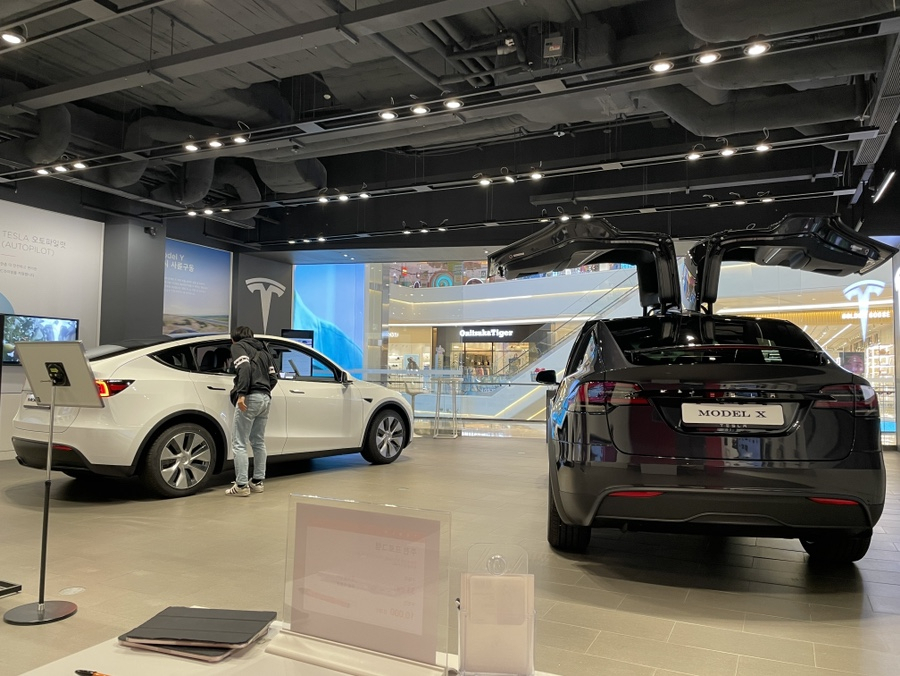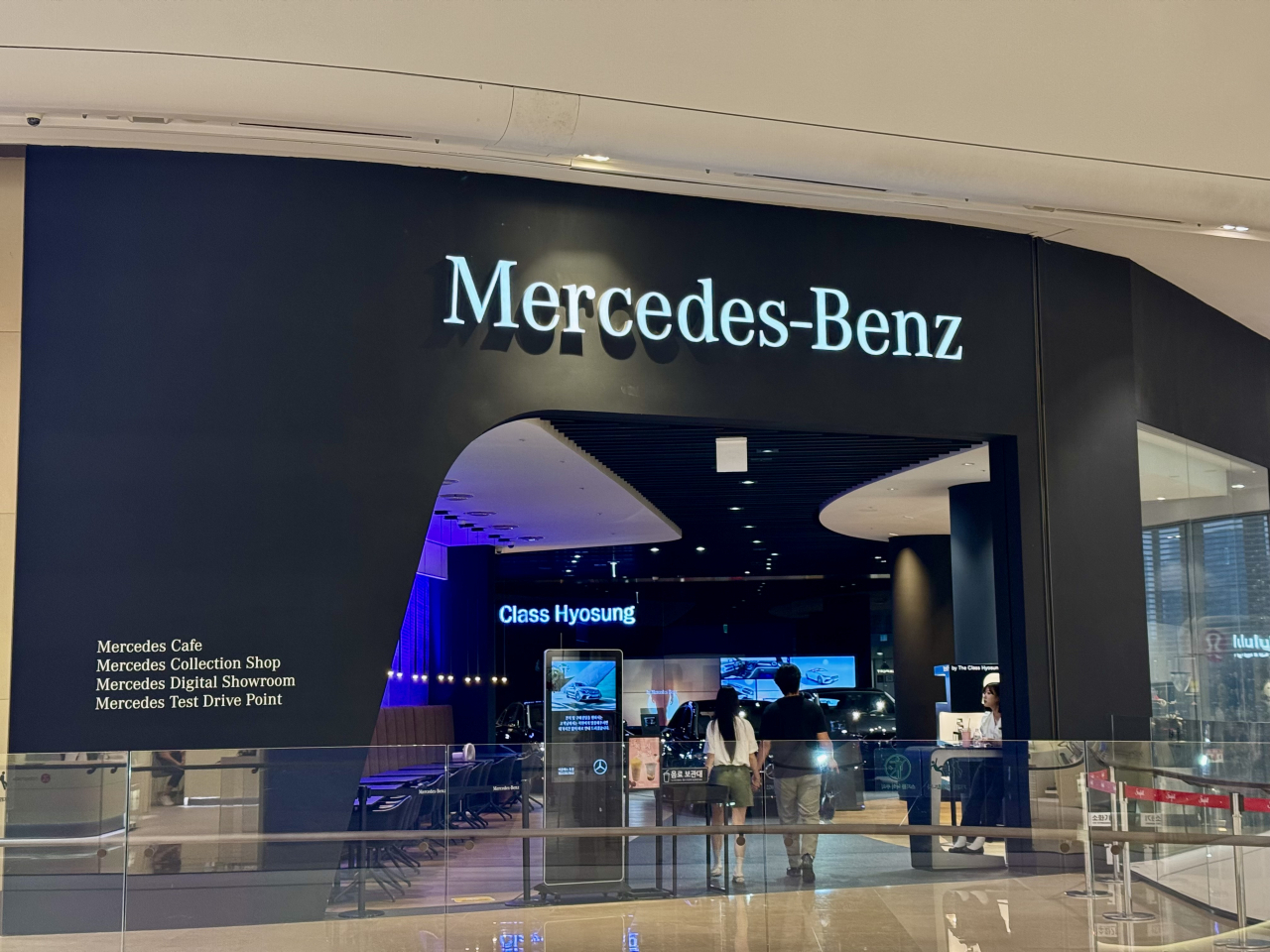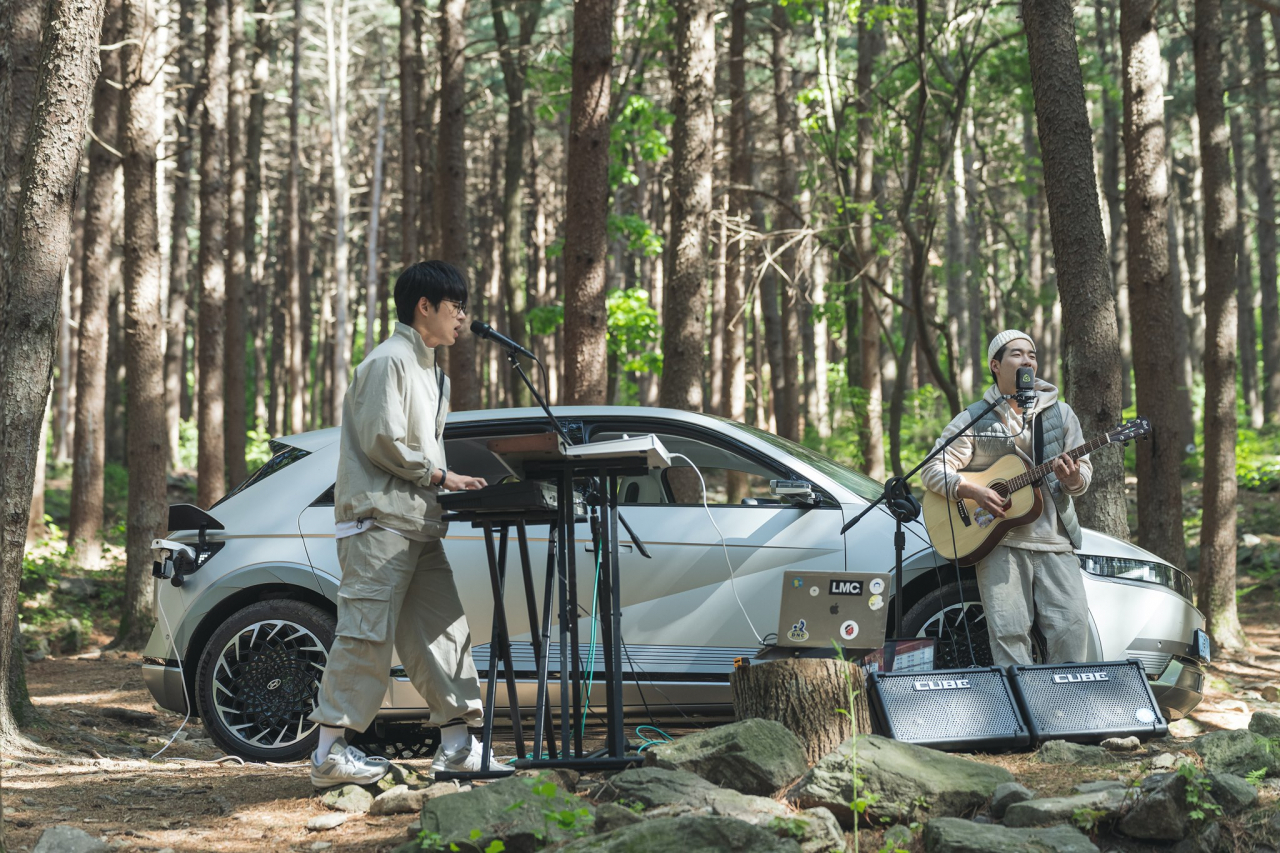
 |
| A visitor takes a look at a white Tesla Model Y on the left at the Tesla Store in Starfield Hanam, a shopping complex located in Gyeonggi Province just east of Seoul, Aug. 24. (Moon Joon-hyun/The Korea Herald) |
Starfield Hanam, a shopping complex located in Gyeonggi Province just east of Seoul, is home to South Korea’s first Tesla showroom, which opened its doors in 2017. Here, the allure of Tesla vehicles has always drawn a crowd, but recently, a different kind of interest has been brewing among potential buyers -- an interest not just in the cars themselves, but in the batteries that power them.
Recent high-profile EV fires in Korea have sparked public concern about the reliability of the batteries that fuel these high-tech machines. One Tesla employee at the Starfield Hanam showroom said, “We’ve seen a definite uptick in questions about battery manufacturers lately. Some customers have expressed concern about the safety of the Chinese-made CATL batteries in the Tesla Model Y.”
But not all of these concerns are knee-jerk reactions to alarming headlines. Unlike many EV buyers, Tesla customers often arrive well-informed, already aware of the different battery configurations available in the market.
“It’s like when you’re buying a computer -- you don’t just look at the brand of the laptop, like Lenovo or Apple. You’re also thinking about the CPU or GPU, whether it’s Intel, AMD, or Nvidia. Similarly, a considerable portion of potential Tesla buyers and owners are savvy enough to evaluate the battery makers, not just the car itself,” the employee said.
Fires fuel EV battery branding and China bias
Interest in EV batteries surged after a Mercedes-Benz electric car caught fire in Incheon, revealing it used batteries from the lesser-known Chinese firm Farasis Energy. The revelation has prompted consumers, who might have previously overlooked the importance of battery origin, to reconsider their purchasing priorities. The big question now is whether the brand of an EV’s battery will become as significant a factor as the car brand itself.
The growing awareness has also stoked a bias against Chinese-made batteries. Even though this perception is not grounded in technical evidence, this divide between Korean and Chinese manufacturers is becoming more pronounced as more consumers become educated about battery brands.
At Starfield Hanam, where several major automakers have showrooms, this sentiment was echoed by representatives from other brands. A Genesis representative noted, "Customers were reassured to learn that the GV70 EV on display uses batteries from SK On, a Korean manufacturer." Over at BMW, an employee mentioned that while their i7 eDrive50 on display uses Samsung SDI batteries, some customers were "surprised and skeptical" to discover that other models, like the iX3, rely on CATL batteries.
 |
| Visitors enter the Mercedes-Benz showroom in Starfield Hanam, a shopping complex located in Gyeonggi Province just east of Seoul, Aug. 24. The EQE 500 SUV was the only EV model on display. (Moon Joon-hyun/The Korea Herald) |
A Mercedes-Benz showroom representative declined to comment on recent customer inquiries about battery manufacturers, noting only that the EQE 500 SUV on display is equipped with a Farasis Energy battery.
Competition for EV battery marketing
Globally, there's a trend toward mandatory EV battery disclosure. Following a series of EV fires, Korean automakers have started voluntarily disclosing battery information, with government plans to make it mandatory. The EU will require disclosure by 2026, and states like California are introducing labeling systems to reveal battery origins.
Historically, EV battery manufacturers were either assumed or sporadically reported, often shielded by trade secrets. But with batteries accounting for 30 to 40 percent of an EV's cost, transparency is becoming a necessity, intensifying competition not just among automakers but also between battery manufacturers themselves.
South Korea's three major battery producers -- LG Energy Solution, SK On, and Samsung SDI -- are ramping up brand marketing in response.
 |
| SK On collaborated with the Korean band Lucy last year to launch a marketing campaign that demonstrates the vehicle-to-load capabilities of their Hyundai Ionic 5 battery. The band used this technology to power their musical instruments during outdoor performances in natural settings. (SK On) |
SK On, for instance, showcased the capability of its batteries through a unique marketing campaign: a beachside busking performance powered entirely by a Hyundai Ioniq 5 equipped with SK On batteries. Meanwhile, Samsung SDI has taken a different approach, promoting its proprietary battery brand, PRiMX, while LG Energy Solution has been actively advertising its B-Lifecare service, which allows users to monitor their EV battery’s status via a smartphone app.
“Until now, most EV buyers only focused on automaker brands. But with more battery transparency, branding and technology differences between battery makers could play a larger role in buying decisions,” said Sun Yang-kook, an energy engineering professor at Hanyang University.
The runaway success of ‘Chinese Tesla’
Tesla provides a case study in how this dynamic is already at play. Despite not officially disclosing battery suppliers, the EV giant has cultivated a tech-savvy, well-informed customer base that factors detailed battery specifications into purchasing decisions.
For example, the Tesla Model Y initially launched in South Korea in 2021 with a price between 78 and 85 million won ($58,337 and $63,572) for models powered by high-end Panasonic and LG batteries. However, the introduction of a lower-range, rear-wheel-drive model last year with more affordable CATL batteries dropped the starting price by over 20 million won, making it a hit and the best-selling vehicle in Korea's imported car market last year.
“Tesla customers trust the brand deeply and recognize that CATL is the world’s largest battery manufacturer. They seem to appreciate the cost savings that come with the Chinese-made batteries, seeing them as a smart trade-off rather than a compromise,” Professor Sun added.
Data from the Korea Transportation Safety Authority shows that, of the 106 EVs sold in South Korea that disclosed their battery manufacturers by last week, 35 used LG Energy Solution batteries, 26 used SK On, and 23 were powered by CATL.
Lee Jung-doo, secondary battery program director at the Korea Evaluation Institute of Industrial Technology, said, “Chinese batteries aren’t inherently inferior, but when luxury brands like Mercedes-Benz use products from lesser-known firms like Farasis Energy, it raises concerns. However, you can pretty much trust that top global companies like CATL produce high-quality, safe products, despite significant consumer bias against Chinese-made batteries.”
“Hyundai and Kia use CATL batteries in mid- to low-priced cars like the Kona, Ray, and Niro, which avoids consumer backlash. But for a high-priced car like the BMW iX3, which costs about 82.6 million won but uses a CATL battery, overcoming consumer prejudice will be a challenge,” Lee added.









